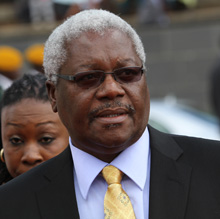
THE directive by Local Government minister Ignatius Chombo ordering all the country’s councils to write off household debts is illegal, a lawyer’s think-tank said yesterday.
NQOBANI NDLOVU STAFF REPORTER
Veritas, a local organisation that provides information on the work of Parliament and the Laws of Zimbabwe, said local authorities do not have powers to cancel debts unless the debt is irrecoverable or not worth recovering.
“The first and most obvious point to make is that the minister cannot order councils to do something they are not allowed to do — and, as pointed out above, councils cannot write off debts except to the extent that they are specifically allowed to do so by statute,” Veritas said.
“The minister’s directive was therefore illegal, and councils not only may, but must disregard it.”
Chombo ordered all local authorities to write off debts accumulated between February 2009 and June 30 2013 saying residents were too financially burdened to pay.
The directive viewed as a populist move to woo votes was condemned by experts as a recipe for disaster for already financially-strained councils.
In Bulawayo, council has indicated that the write-off has left it in a worse off financial situation as seen by its failure to pay workers on time.
- Chamisa under fire over US$120K donation
- Mavhunga puts DeMbare into Chibuku quarterfinals
- Pension funds bet on Cabora Bassa oilfields
- Councils defy govt fire tender directive
Keep Reading
Veritas argued that debt can only be written off through an Act of Parliament.
“As a general rule, public bodies such as local authorities are not allowed to write off debts owed to them unless an Act of Parliament specifically allows them to do so.
“There is a good reason for this rule: Local authorities’ revenues are trust money in which ratepayers have an interest and the authorities have a duty towards their ratepayers as a whole to collect those revenues,” Veritas said.
“Both the Urban Councils Act and the Rural District Councils Act give councils a limited power to write off debts.”
The lawyer’s think-tank, citing Section 283 of the Urban Councils Act, said debts can only be cancelled if they “have remained unpaid for at least five years if the council considers they cannot be recovered or that the expense and difficulty of recovering them would be greater than the amount owed . . . or if the person who owes them has become insolvent or, in the case of a company, has gone into liquidation”.
Chombo justified the debt cancellation saying the amounts owed by residents since February 2009 had become prescribed and irrecoverable, but Veritas said he was wrong.
“Municipal and rural district council rates and levies are imposed under Acts of Parliament — the Urban Councils Act and the Rural District Councils Act, respectively — and are a form of taxation.
“Debts in respect of rates and levies are therefore covered by Section 15(a) (iii) of the Prescription Act and remain recoverable for 30 years. Hence, contrary to what the minister said, debts which residents owed for rates as at February 2009 will not become prescribed (that is will not be extinguished) until 2039.”










